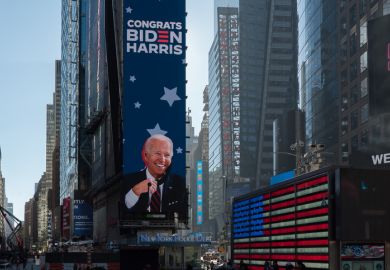Visa delays and travel restrictions are having a “devastating effect” on international students’ hopes of attending US universities this autumn, a conference has heard.
The US’ 1 million foreign students contributed $44 billion (£32 billion) to the economy in 2019-20. The most prominent cohort are Chinese students, who nearly quadrupled in number from 2008 to 2018, and made up one-third of the US international student body before Covid hit.
But applications to US universities from China are down this year. William Kirby, a China studies professor at Harvard University, told Times Higher Education’s THE Live US event that they were “a casualty of several things: travel restrictions both on the Chinese and the American side, and a political atmosphere which turned so sour during the last two years of the Trump administration”.
Aside from political tensions and rising xenophobia, practical hurdles are also keeping international students away. Only 43 of 233 posts for processing visas are running at full capacity, according to the US Department of State.
Anthony Koliha, director of the Office of Global Educational Programs at the State Department, assured the audience that “consular staff are prioritising student visas” and that “we’re all committed to getting international students to the US safely”.
However, Miriam Feldblum, executive director of the Presidents’ Alliance on Higher Education and Immigration, was less sanguine.
“The reality is chilling,” she said. “Embassy closures, visa delays and travel restrictions are having a devastating effect. If this is not addressed soon, like in the next month or two, we’ll have another fall [in] international student enrolment.”
Dr Feldblum said that setting up “a robust immigration programme is crucial for our campuses”.
“For us to reach the next level of vibrant international student mobility, we need a national policy” that will not only attract students but retain them, including for work after graduation, she said.
“Diversity drives excellence,” she said. “And talent pipelines transcend borders.”
Philip Altbach, founding director of the Center for International Higher Education at Boston College, called the key issues the four Cs: Covid, climate, China and commercialisation.
“My prediction is that the coming year will not be a happy picture,” he said. “The lack of student numbers is really worrying. Our universities need to be very aware of the problem.”
He said that even without the effects of Covid, it was important for the US to diversify its student body, since there will always be cycles of “ups and downs” in mobility.
“The number of Chinese students to the US is levelling off. That tremendous boom is going to end,” he said. “US institutions need to think about and focus on other countries. For example, India may become more important.”
Professor Kirby warned against falling into “America’s rich and unhappy history of quotas – that is something we must resist”.
“One thing I would not like to see is people saying: ‘Oh, there’s too many Chinese,’” he said.
“Excellence in universities comes by learning from one another and the exchange of faculty and students across oceans,” Professor Kirby added. “Anything that endangers that endangers the future of universities around the world. Forces of isolation, either in the United States or elsewhere, are a death sentence for universities.”
Register to continue
Why register?
- Registration is free and only takes a moment
- Once registered, you can read 3 articles a month
- Sign up for our newsletter
Subscribe
Or subscribe for unlimited access to:
- Unlimited access to news, views, insights & reviews
- Digital editions
- Digital access to THE’s university and college rankings analysis
Already registered or a current subscriber?








